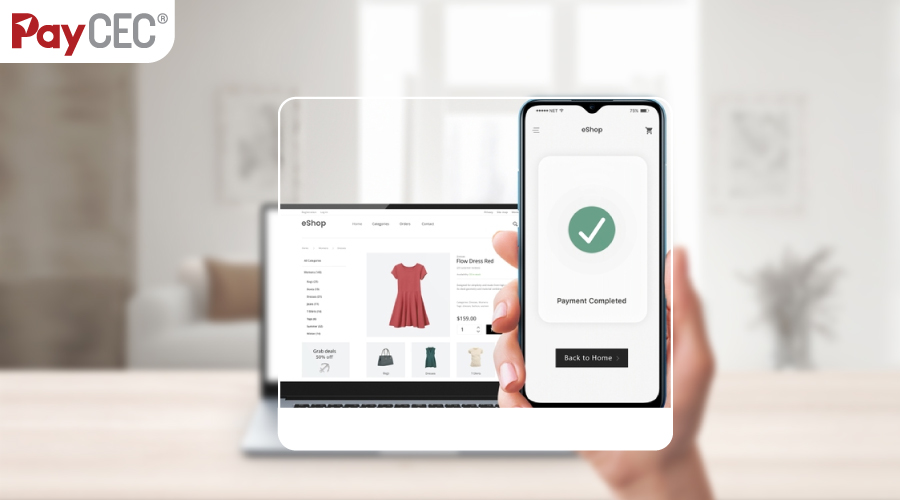- Hotline +65 6631 8332
Would a Payment Gateway With No Transaction Fee An Ideal Choice For Your Business?
Tuesday, 06 Feb, 2024

This article is a part of PayCEC payment insights
Follow PayCEC - global payment gateway to get updates on the latest payment trends and ecommerce news
What's inside?
While it's not common for payment gateways to offer completely fee-free transactions, some providers may advertise low or no transaction fees as part of their marketing strategy. However, it's essential to carefully examine the terms and conditions to understand the full cost structure and potential limitations.
Most of the time, though claiming not to be included with any transaction fee, some payment gateway systems from many providers have already had hidden costs in the cost structure, which their clients often neglect.

Most businesses don’t know what is hidden behind a payment gateway claiming to have no transaction fee.
Transaction Fee And The Cost Structure Behind It
The transaction fee in a payment gateway is a charge imposed by the service provider when a customer makes payments, or financial transactions to their sellers. Payment gateways act as intermediaries that handle the digital transfer of funds between the customer's bank and the merchant's bank, ensuring a secure and seamless payment process.
The transaction fee includes all types of fees needed to efficiently facilitate the transaction. It typically covers the costs associated with processing and managing the digital payment, including the infrastructure that processes the payment, the costs for archiving compliance and regulations, the cost of integrating security protocol, and the cost of assisting customers in specific situations.
- Payment gateway processing infrastructure: The payment gateway integration cost and the cost for maintaining the technology and system required to securely transfer and process the payment information.
- Compliance and regulatory requirements: The cost to adhere to standards and regulatory compliance requirements to be accepted for use. Which incur costs related to compliance and legal obligations.
- Security measures: The cost of archiving and maintaining the robust security protocol to safeguard sensitive financial information as well as to prevent fraudulent transactions.
- Customer support: The cost of providing appropriate assistance to users and addressing any issue related to payment requires resources, and transaction fees may help to cover all these support costs.
The transaction cost structure is categorized into 4 or more types of cost as mentioned above, and can be structured in various ways, such as a flat fee per transaction, a percentage of the transaction amount, or both.
In actual cases, different payment gateways may offer different transaction fee structures, and the choice often depends on the specific needs and priorities of the business. In another aspect, those payment gateway structures can be omitted and replaced with other types of costs that make their merchants feel comfortable with purchasing them.
Payment Gateway Providers And Their “No Transaction Fee” Strategies
There are several ways for those payment gateway providers to make up their services as having “no transaction fees”. Such as markup on subscription-based models. That means, that instead of charging per transaction or applying a flat rate to the service costs, the payment gateway providers offer merchants a subscription or membership model, with the transaction fees already included.

A payment gateway claims to include no transaction fee and often has other types of hidden costs.
Another popular method of offering businesses payment gateways with no transaction fees is using tiered pricing models. The providers will plan and build pricing models based on the scale of each type of business, startup, small and medium enterprises, and big corporations. That way, smaller businesses with lower transaction volume or business size may benefit from lower or no transaction fees.
Those providers can also use the cross-selling additional services to make up for those transaction costs. Those services are often ones that providers know will trigger their customers to purchase the most, such as fraud protection, analytics features, marketing tools, etc.
Besides, things can be negotiated when there is a more lucrative way of collaborating between the payment gateway providers and merchants. Following that, to get rid of or minimize the transaction fee in the cost structure, merchants need to reach a specific deal called the volume commitment. By achieving a minimum transaction volume, merchants will be able to negotiate to rearrange their transaction cost structure with the provider. Merchants with higher transaction volume may have better deals or more favorable deals.
Those payment gateway providers that claim their products or services to have no transaction costs might have their ways of structuring their pricing model differently or use alternative revenue resources to cover all of those expenses as mentioned above. Therefore, the tip is to examine carefully their terms and conditions, the fee structure, and other additional costs that may be added in the contrast before deciding to collaborate with them.
Evaluating the True Cost Of What Is Called “Payment Gateways with No Transaction Fees”
While the absence of transaction fees may seem appealing, it's important to carefully consider the following aspects before determining if such a gateway is an ideal choice for your business:
Even if a payment gateway claims to have no transaction fees, there may be other hidden fees, such as setup fees, monthly fees, or charges for specific features. Carefully review the entire fee structure to ensure you're aware of all potential costs.

The impact of zero transaction fee gateways on small businesses.
Although claiming to have no transaction fees, some payment gateways offering no transaction fees may impose limits on transaction volume or value. As a result, when exceeding these limits, merchants may be charged or switch to a different fee structure. Therefore, before deciding to collaborate with a payment gateway provider, consider any limitations and assess whether they align with your business needs.
In another case, if your business deals with international customers and multiple currencies, check whether the payment gateway charges fees for currency conversion. This can be a significant cost for businesses with global transactions.
- One more thing to notice in a payment gateway claiming to have no transaction fee is to evaluate the reliability of the provider and the quality of customer support. A payment gateway with no transaction fees may cut corners in terms of service quality, leading to potential issues that could impact your business operations.
- There are more to check up on, such as the Integration complexity, additional features and services, contract terms, scalability, reviews and reputation, regulatory compliance, etc. However, the key aspects mentioned above are considered enough for you to keep in mind when choosing a payment gateway.
- While finding a reliable payment gateway with no transaction fees may be an impossible task, you may want to consider the following payment gateways with low transaction fees. They are suggested with a list of criteria that you may want to explore for more details.
The Future of Fee-Free Transactions: Emerging Technologies and Solutions

Focusing on advancements in emerging technologies may lead to complete fee-free transaction options for businesses and merchants.
Although being mentioned in this article as a fixed expense that only be transferred from one structure to another, the future of fee-free transactions still holds promising possibilities, driven by emerging technologies and innovative solutions, with emerging technologies like blockchain, cryptocurrencies, and DeFi.
Blockchain technology and cryptocurrencies have the potential to revolutionize payment processing. With decentralized and transparent ledgers, blockchain can significantly reduce or eliminate intermediaries, leading to lower transaction costs. Cryptocurrencies may offer fee-free or low-cost transactions, particularly for cross-border payments.
DeFi platforms, built on blockchain, aim to recreate traditional financial services without central authorities. These platforms often operate with lower fees compared to traditional financial institutions. As DeFi evolves, it could provide fee-free or cost-effective alternatives for merchants to transact and receive payments.
It's important to note that while these advancements hold promise, the transition to entirely fee-free transactions may take time, and challenges such as scalability, regulatory compliance, and consumer adoption must be addressed.
Merchants should stay informed about emerging technologies, industry trends, and regulatory changes to leverage fee-free transaction options as they become available in the evolving landscape of payment processing.
PayCEC - A Payment Gateway With No Hidden Fees
Aiming to become the most prestigious payment gateway provider with innovative payment solutions for every type of enterprise, PayCEC not only focuses on investing in its services but also takes user experience as a priority in its operation motto. Among those strategies to enhance customer experience on-site and when using services, clearance in pricing is the first to be mentioned.
PayCEC has no hidden fees and every category on pricing is mentioned and explained to the partners with full context. We only charge a fixed fee of 3% on every purchase.
In addition, the company offers their partner's payment gateway integration services with 24-hour fast integration and zero set-up fee, allowing merchant partners to immediately assist their customers right after deciding to collaborate with the company.
Also, our account management fee is calculated with transparency. Particularly, the cost for maintenance accounts for the first three months is completely free, and is at $50/month from the fourth month on.
Moreover, there are a lot of good offers for merchants when partnering with PayCEC in terms of payment gateway fees. Choosing the right payment gateway provider for your business is crucial in operating in the global market. And PayCEC will walk you through this stage of reaching your goals outside of what you and your businesses have already experienced. Starting from being a payment gateway solution that is tailored for your business in terms of pricing.
-
In conclusion, if you come across a payment gateway advertising no transaction fees, approach it with caution and thoroughly evaluate the overall cost structure, potential limitations, and the quality of services provided. And remember to always read the fine print and consider the specific needs of your business before making a decision.
Frequently Asked Questions
Which payment gateway has no transaction fee?
it is uncommon to find a payment gateway that operates entirely without transaction fees. Payment gateways typically charge fees for processing transactions and providing related services, which may include a percentage of the transaction amount or a flat fee per transaction.
Actually, there is no widely recognized payment gateway that operates entirely without transaction fees. Most payment gateways charge fees as a percentage of the transaction amount or a flat fee per transaction to cover the costs of processing payments and providing related services.
It's essential to carefully review the terms and conditions of any payment gateway that claims to have no transaction fees. In some cases, providers may offer promotional periods with no fees for a limited time or under specific conditions. However, it's crucial to be cautious and consider the overall fee structure, as there may be other costs or limitations associated with the service.
Are there any free payment gateways?
There are payment gateways that offer free plans or services, but it's important to note that "free" typically comes with limitations, and they may have fees for certain features or transactions. Here are a few examples:
- PayPal: PayPal offers a free basic account for individuals and businesses. While there are no setup or monthly fees, transaction fees apply when money is received.
- PayCEC: PayCEC offers seamless global payment gateway solution with a lot of benefits to the customers, including 24-hour fast integration, no set up fee, no hidden fee, and many more.
- Stripe: Stripe provides a pay-as-you-go model with no setup or monthly fees. Transaction fees apply based on successful transactions.
- Square: Square offers a free plan with no monthly fees. However, transaction fees are applied for each processed payment.
- 2Checkout (now Verifone): 2Checkout has a free version with no setup fees, but transaction fees apply. It's important to review their pricing for details.
- Authorize.Net (via resellers): Some resellers of Authorize.Net may offer free setup or limited free transactions as part of their service.
It's crucial to carefully review the terms and conditions, as well as the specific fee structures of any payment gateway to understand the full scope of costs associated with your business needs. Keep in mind that payment gateway pricing models may change over time, and it's advisable to check directly with the providers for the most up-to-date information.
How do I avoid payment gateway charges?
Avoiding payment gateway charges entirely may be challenging, as most payment gateways charge fees for their services. However, you can optimize your usage and minimize costs through the following strategies:
- Choose a Cost-Effective Provider: Compare different payment gateway providers and choose one with competitive and transparent fee structures. Consider factors such as transaction fees, setup costs, and any additional fees.
- Negotiate Fees: Some payment gateways may be open to negotiation, especially for businesses with higher transaction volumes. Contact the provider to discuss potential discounts or custom pricing.
- Explore Flat-Fee Models: Some payment gateways offer flat-fee pricing models, where you pay a fixed amount per transaction. This can be advantageous for businesses with a predictable transaction volume.
- Leverage Volume Discounts: If your business processes a significant number of transactions, inquire about volume discounts. Some payment gateways offer reduced fees for higher transaction volumes.
- Utilize Promo or Trial Periods: Take advantage of promotional or trial periods offered by some payment gateways. These periods may include reduced or waived fees for a limited time.
- Understand Fee Structures: Familiarize yourself with the fee structures of your chosen payment gateway. Be aware of any hidden fees, such as chargeback or currency conversion fees, and factor them into your cost analysis.
- Optimize Transaction Methods: Choose transaction methods with lower fees. For example, ACH (Automated Clearing House) transactions may have lower fees compared to credit card transactions.
- Monitor Chargeback Ratios: High chargeback ratios can lead to additional fees. Implement measures to prevent chargebacks, such as clear communication with customers and providing accurate product descriptions.
- Review Terms and Conditions: Regularly review the terms and conditions of your payment gateway provider to stay informed about any changes in fee structures or policies.
- Explore Alternative Payment Solutions: Depending on your business model, consider exploring alternative payment solutions that may have different fee structures or offer cost-effective options.
It's crucial to strike a balance between minimizing costs and ensuring that the chosen payment gateway meets your business needs. Regularly reassess your payment processing needs and explore new options to optimize your payment gateway expenses.
What is the cheapest payment platform?
Determining the "cheapest" payment platform depends on various factors such as your business model, transaction volume, types of transactions, and geographic locations served. Below are some payment platforms known for their competitive pricing:
- PayCEC: PayCEC provides a seamless global payment gateway solution, offering numerous advantages to customers. These include rapid 24-hour integration, no setup fees, transparent pricing with no hidden fees, and various other benefits.
- Square: Square is known for its straightforward pricing with no monthly fees. It is suitable for small businesses and offers transparent transaction fees.
- Stripe: Stripe offers a pay-as-you-go model with no setup or monthly fees. Transaction fees apply based on successful transactions. It is popular among businesses of various sizes.
- PayPal: PayPal provides a free basic account with no setup fees. While there are no monthly fees, transaction fees apply when money is received. It's widely used for online transactions.
Remember that the cheapest option may not always be the best fit for your specific business requirements. Consider factors such as ease of integration, customer support, security features, and available payment methods when choosing a payment platform. Additionally, fee structures may change over time, so it's essential to check with the providers for the most up-to-date information.
News
Business
Products

who we are
about us
We are honored to serve as your reliable business partner and financial service provider in the industry and other business-related services. With the help of our professional staff, to help merchants to achieve their goals for the development and expansion of the international business market.
Our payment flow has developed in the e-commerce world to perform seamlessly and effectively across all platforms and devices. We take pleasure in combining technology with customer service, to solve your concerns at the moment.
PayCEC is a fully worldwide payment network that not only allows merchants to be paid immediately and securely, but also allows them to withdraw money in multiple currencies to their company accounts.
































 +65 6631 8332
+65 6631 8332






 Processing
Processing